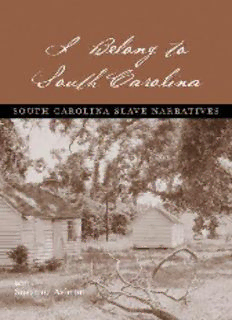
I Belong to South Carolina: South Carolina Slave Narratives PDF
Preview I Belong to South Carolina: South Carolina Slave Narratives
I Belong to South Carolina This page intentionally left blank I Belong to South Carolina South Carolina Slave Narratives (cid:1) Edited by Susanna Ashton with the assistance of Robyn E. Adams, Maximilien Blanton, Laura V. Bridges, E. Langston Culler, Cooper Leigh Hill, Deanna L. Panetta, and Kelly E. Riddle The University of South Carolina Press © 2010 University of South Carolina Cloth and paperback editions published by the University of South Carolina Press, 2010 Ebook edition published in Columbia, South Carolina, by the University of South Carolina Press, 2012 www.sc.edu/uscpress 21 20 19 18 17 16 15 14 13 12 10 9 8 7 6 5 4 3 2 1 The Library of Congress has cataloged the print editions as follows: I belong to South Carolina : South Carolina slave narratives : the lives of Boston King, Clarinda, "A runaway," John Andrew Jackson, Jacob Stroyer, Irving Lowery, and Sam Aleckson / edited by Susanna Ashton ; with the assistance of Robyn E. Adams ... [et al.]. p. cm. Includes index. ISBN 978-1-57003-900-3 (cloth : alk. paper) — ISBN 978-1-57003-901-0 (pbk : alk. paper) 1. Slave narratives—South Carolina. 2. Slaves—South Carolina—Biography. 3. Slavery—South Carolina—History—Sources. I. Ashton, Susanna, 1967– II. Adams, Robyn E. E185.93.S7I2 2010 303.3'620922757—dc22 [B] 2009051095 ISBN 978-1-61117-167-9 (ebook) Contents Acknowledgments | vii Editorial Method | ix Introduction | 1 Memoirs of the Life of Boston King, a Black Preacher (1798) | 14 “Clarinda: A Pious Colored Woman of South Carolina” (1875) | 40 “Recollections of Slavery by a Runaway Slave” (1838) | 49 The Experience of a Slave in South Carolina,by John Andrew Jackson (1862) | 83 My Life in the South,by Jacob Stroyer (1885) | 127 Life on the Old Plantation in Ante-Bellum Days, or a Story Based on Facts by the Reverend I. E. Lowery(1911) | 167 Before the War and after the Union: An Autobiography, by Sam Aleckson (1929) | 228 Afterword—the Slave Experience in South Carolina | 294 Index | 307 This page intentionally left blank Acknowledgments Thanks for research and reference assistance are owed to the library staff at Swarthmore Friends Historical Library, especially Christopher Dens- more, who helped trace Clarinda to 1837. Allen Thigpen of Sumter shared very useful information about the history of I. E. Lowery for which I am grateful. The reference and the interlibrary loan specialists at Clemson University Library were patient and obliging throughout the long course of this project, and the scholars at the Maine Historical Society were in- valuable in helping trace the history of the anonymous author of Recollec- tions of a Runaway Slave. Drafts of various parts of this work were read and greatly improved by Joe Mai, Mike LeMahieu, Rhonnda Thomas, James Burns, Stephanie Barczewski, Aga Skordzka, and Elizabeth Rivlin. Editorial assistance from Misry Soles, Charis Chapman, Russell Hehn, and Leslie Haines also helped move this project to completion. This project was made possible by special grants from the College of Arts, Architecture and Humanities at Clemson University. Finally, but most important, the Clemson University–wide program for the pursuit of creative inquiry in the classroom inspired the creation of this special team investigation and made it happen by funding the year-long course and expenses associated with the necessary research and writing. Editorial Method The goal for editing these texts was simply to make alterations only when helpful to contemporary readers and yet not unnecessarily diminish the tone and historical phrasing particular to these narratives. Silent changes were made in some small instances to remove misleading punctuation and to correct spelling or printing errors that rendered words incompre- hensible. Various versions of “Sumpter,” “Sumter,” “Sumpterville,” and “Fort Sumpter” were left as they were in each narrative to reflect the prac- tices of different eras and regions. No changes were made to dialect phrases or words already within quotation marks, nor were capitalization practices altered to reflect contemporary sensibilities. This is particularly notable with the terms “negro,” “negroes,” “Negro,” and “Negroes,” which were left precisely as the original printed manuscript read. In order to convey the significance of the serial reading experience— most important for “Recollections of Slavery by a Runaway Slave,” which initially appeared in the Advocate of Freedomand later in the Emancipator, and also for the memoirs of Boston King, whose narrative was originally published in the Methodist Magazine—the installment breaks are indi- cated. In the case of the Reverend I. E. Lowery, whose memoir consists of an initial serialized narrative published by a friend in conjunction with his own later additions and stories in book form, the complete 1911 edi- tion of the text appears, and thus the breaks in the initial sections of the serialized version are not indicated. While the lives of Boston King, Clarinda, “A Runaway,” John Andrew Jackson, and Sam Aleckson are presented here in their entirety, Jacob Stroyer’s narrative and that of I. E. Lowery are trimmed to emphasize their individual life stories and also to focus attention on the narrative thrust of these works. Thus a long chapter of Stroyer’s narrative that con- cerns generalized anecdotes and impersonal recollections of slavery was ix | Editorial Method excised, as was an appendix assembled by Lowery that excerpts and sum- marizes newsp aper articles, letters, and other documents attesting to the positive relationships between white and black southerners. Omit- ting these sections should assist readers in focusing on the compelling personal testimony these people provide about the South Carolina slave experience.
Description: